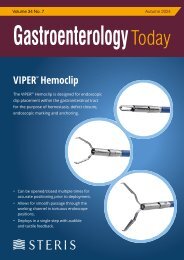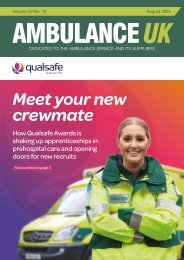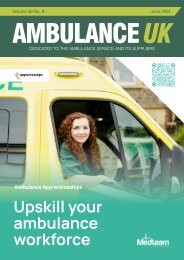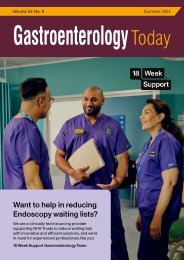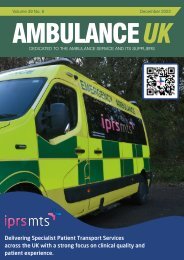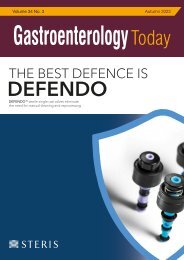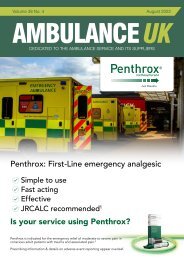Ambulance UK April 2021
Ambulance UK April 2021
Ambulance UK April 2021
Create successful ePaper yourself
Turn your PDF publications into a flip-book with our unique Google optimized e-Paper software.
NEWSLINE<br />
“We consider our new airbase and<br />
charity headquarters to be a vital<br />
development for the whole of the<br />
region. The new facility, located in<br />
Cosford, Shropshire, will feature<br />
clinical training facilities, which<br />
are fundamental to delivering the<br />
advanced training programmes<br />
required for our clinicians. This will<br />
ensure the critical care team are<br />
equipped to treat the increasingly<br />
complex patient cases and will<br />
enhance our daily lifesaving service.”<br />
A report by planning officer, Richard<br />
Fortune at Shropshire Council, who<br />
supported the plans says: “There<br />
is substantial public benefit from<br />
the provision of this service and the<br />
case presented amounts to very<br />
special circumstances sufficient to<br />
justify this proposal.”<br />
Midlands Air <strong>Ambulance</strong> Charity<br />
has been working with architects,<br />
Box Developments to design<br />
the facility, and planning and<br />
development consultancy Turley<br />
to secure planning permission<br />
from Shropshire Council. Initial<br />
groundwork will start on site this<br />
spring, and the site is expected<br />
to be completed late 2022. The<br />
new facility will complement the<br />
charity’s existing air ambulanceled<br />
service across the six<br />
Midlands counties.<br />
Initial funding for the new<br />
development has been<br />
facilitated via major grants<br />
from organisations such as the<br />
Department for Health and Social<br />
Care and the HELP Appeal.<br />
In addition, the charity will use<br />
a proportion of its modest<br />
reserves and undertake specific<br />
fundraising campaigns for areas<br />
of the new airbase, including the<br />
clinical simulation training suite,<br />
memory garden and community<br />
education zone.<br />
For more information on<br />
Midlands Air <strong>Ambulance</strong> Charity<br />
and the plans can be found at<br />
midlandsairambulance.com/<br />
airbaseheadquarters and follow<br />
the organisation on social media.<br />
SCAS<br />
<strong>Ambulance</strong> service<br />
first to supply<br />
Covid-19 patients<br />
with home oxygen<br />
monitoring kits to<br />
spot deterioration<br />
Paramedics at South Central<br />
<strong>Ambulance</strong> Service (SCAS) have<br />
become the first in the country<br />
to supply Covid-19 patients with<br />
home oxygen monitoring kits<br />
if they don’t require immediate<br />
admission to hospital but are at<br />
higher risk of complications.<br />
The initiative, which began in<br />
Hampshire but is now running<br />
across the Thames Valley region,<br />
will ensure patients who have mild<br />
symptoms but have other risk<br />
factors, such as age over 65 years,<br />
cancer or other health conditions,<br />
can monitor their oxygen levels<br />
and know when to seek help.<br />
The packs contain a pulse<br />
oximeter device, a symptom diary<br />
and a set of strict guidelines and<br />
are only distributed to patients who<br />
require emergency assessment by<br />
the ambulance service.<br />
The development follows recent<br />
research by clinicians at SCAS<br />
which identified that just a slight<br />
drop in blood oxygen levels - but<br />
within the normal range - could be<br />
an early important warning sign of<br />
deterioration in patients before the<br />
onset of breathlessness.<br />
In most cases of bacteria and<br />
non-Covid pneumonia, shortness<br />
of breath appears relatively early<br />
in the disease and ahead of any<br />
significant drop in oxygen levels,<br />
known as hypoxia.<br />
However, with Covid-19, a drop<br />
in oxygen levels often comes<br />
first, which is referred to as “silent<br />
hypoxia”, and patients can be<br />
significantly unwell by the time<br />
they become breathless.<br />
The team, which included SCAS<br />
Medical Director Dr John Black<br />
and Divisional Medical Director<br />
Professor Charles Deakin, studied<br />
almost 20,000 patients who called<br />
for an ambulance between March<br />
1 and July 31 last year.<br />
They then analysed the oxygen<br />
levels of 1,080 confirmed Covid<br />
positive patients at the point<br />
they were initially assessed by<br />
paramedics at home.<br />
Patients whose blood oxygen<br />
levels dropped only 1% to 2%<br />
below 96% - still within the normal<br />
range of 94% to 98% - and<br />
showed no signs of shortness of<br />
breath often went on to require<br />
admission to intensive care and<br />
had a lower chance of survival.<br />
Following the study, which was<br />
led by Dr Matthew Inada-Kim,<br />
a Consultant in General and<br />
Acute Medicine at Hampshire<br />
Hospitals NHS Foundation Trust<br />
and published as a pre-print via<br />
medRxiv, NHS England launched<br />
a nationwide rollout of its COVID<br />
Oximetry @home initiative.<br />
The project involves supplying<br />
home pulse oximetry kits to<br />
people who test positive and are<br />
at higher risk of complications,<br />
such as those with health<br />
conditions and the over 65s,<br />
with around 300,000 supplied to<br />
patients across the country so far<br />
by local health systems.<br />
The oximeters work by placing<br />
a clip on the end of a finger to<br />
measure oxygen in the blood and<br />
heart rate and, if oxygen levels<br />
drop to 94% or 93%, patients are<br />
asked to call their GP or NHS 111<br />
– or 999 if it falls to 92% or less.<br />
“Our original research helped<br />
to inform the wider rollout of the<br />
COVID Oximetry @home project<br />
to enable patients in high-risk<br />
groups to monitor their blood<br />
oxygen levels directly and help<br />
ensure timely referral to hospital<br />
when indicated,” said Dr Black.<br />
“We are now pleased to be the<br />
first ambulance service to offer<br />
pulse oximeters to patients along<br />
with guidance once we have<br />
assessed them and determined<br />
they don’t need to be taken to<br />
hospital but are at increased risk<br />
of their condition changing.<br />
“It provides patients with the<br />
reassurance that they can keep<br />
regular check on their oxygen<br />
levels independently and seek<br />
the help they need if their levels<br />
drop below 95%, while for us it<br />
means our clinicians can leave<br />
patients knowing they have<br />
the ability to spot any change<br />
promptly and take swift action.”<br />
Dr Inada-Kim, who is also<br />
the National Clinical Lead for<br />
Deterioration at NHS England,<br />
said: “SCAS has produced<br />
groundbreaking research that<br />
has informed national policy and<br />
led to the evolution of the COVID<br />
home oximetry model and its<br />
staff are again leading the way<br />
with this new project to help<br />
identify patients at risk as early<br />
as possible.”<br />
An additional tab is being<br />
added to paramedics’ electronic<br />
patient record devices to allow<br />
them to record the provision of<br />
a pulse oximeter to help with<br />
a retrospective review of the<br />
effectiveness of the initiative.<br />
Dr Black added: “It is hoped that<br />
prompt identification of hypoxia<br />
through home oximetry will lead<br />
to earlier admission to hospital<br />
for patients who subsequently<br />
deteriorate. This has the potential<br />
to improve the clinical outcomes<br />
of Covid-19 patients who<br />
develop complications.”<br />
If a patient does not suffer any<br />
further complications and makes<br />
a recovery at home they are<br />
asked to return the device after<br />
14 days to their own GP Surgery<br />
or to their local COVID Oximetry<br />
@home service.<br />
AMBULANCE <strong>UK</strong> - APRIL<br />
For the latest <strong>Ambulance</strong> Service News visit: www.ambulancenewsdesk.com<br />
51



